Coordinación
Una coordinación sólida puede evitar vacíos y duplicaciones en las respuestas humanitarias, así como garantizar que los PTM complementen otros tipos de asistencia. Sin embargo, el informe del «Estado Global de los Programas de Transferencias Monetarias» de la CALP Network muestra que la coordinación de la asistencia en efectivo es vista como débil y ad hoc, y que esto está teniendo graves repercusiones operativas.
Los donantes, las ONG y los líderes de los grupos de trabajo de transferencias monetarias (GTM) han pedido claridad sobre tres temas principales relacionados con la coordinación de la asistencia en efectivo:
- Quién debe ser responsable de asegurar una coordinación eficaz de la asistencia en efectivo;
- Cuál es la función y el mandato de los grupos de trabajo de transferencias monetarias, incluso en relación con las transferencias monetarias multipropósito;
- Cómo se debe dotar de recursos a la coordinación de asistencia en efectivo.
Tenemos que basarnos urgentemente en lo que funciona y proporcionar claridad a nivel mundial sobre las preguntas arriba mencionadas, adaptándonos a los diferentes contextos. Hace mucho tiempo que se deberían haber tomado decisiones claras basadas en necesidades operativas y no en la política de las agencias.
Prioridades actuales
El objetivo de la CALP Network es contribuir a seguir progresando en este tema en tres niveles: apoyar a los grupos de trabajo de transferencias monetarias a nivel regional; contribuir a soluciones prácticas para la coordinación de la asistencia en efectivo a nivel mundial; y convocar una discusión basada en la evidencia sobre temas clave, destacando puntos de decisión críticos y oportunidades de progreso.
Contenido destacado

Cash Coordination Tip Sheet
Guidelines and Tools
This tip sheet sets out established best practice, key guidance and resources for all aspects of cash coordination, intended as a clear, accessible and action-oriented guide for those engaged in coordination of cash and voucher assistance (CVA) at the field level.

Introducing the Cash Coordination Tip Sheet
Webinar
The CALP Network has developed a tipsheet setting out established best practice and key guidance and resources for all aspects of cash coordination, intended as a clear, accessible and action-oriented guide for those engaged in coordination of cash and voucher assistance at the field level.

Cash Coordination: A proposal from members in MENA
Blog Post
Earlier this year the CALP Network undertook regional consultations to explore options for cash coordination. This blog lays out recommendations from participants from the Middle East and North Africa who sketched out what cash coordination, and coordination more broadly, could look like in future to support a more effective, efficient and accountable response.
Últimos recursos
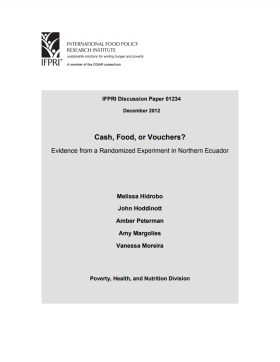
Cash, Food, or Vouchers? Evidence from a randomized experiment in Northern Ecuador
Report
The debate over whether to provide food assistance and the form that this assistance should take has a long history in economics. Despite the ongoing debate, little rigorous evidence exists that compares food assistance in the form of cash versus in-kind. This paper uses a randomized evaluation in...
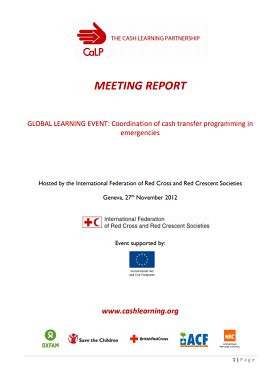
Global Learning Event: Coordination of Cash Transfer Programming in Emergencies
Report
The CALP Network convened a learning event, hosted by the International Federation of Red Cross and Red Crescent Society on 27th November 2012, to explore the issue of the coordination of cash
transfers in emergencies. The meeting provided a platform for dialogue with actors from the UN system, NGOs,...

Humanitarian Coalition East Africa Drought Appeal: Final Evaluation – Somalia
Case Study
In 2011, Somalia suffered from one of the worst droughts in 60 years which left more than 13 million people in need of food, water and emergency healthcare. Canadian donors contributed $14 million to the Humanitarian Coalition’s joint appeal for East Africa’s drought of 2011. These funds helped to...
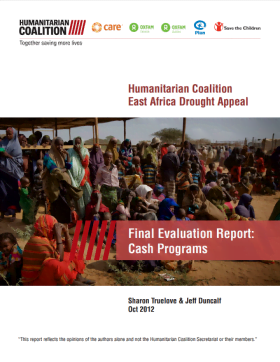
Humanitarian Coalition East Africa Drought Appeal: Final evaluation report – Cash programs
Report
In 2011, suffered from one of the worst droughts in 60 years which left more than 13 million people in need of food, water and emergency healthcare. Canadian donors contributed $14 million to the Humanitarian Coalition’s joint appeal for East Africa’s drought of 2011. These funds helped to set up...
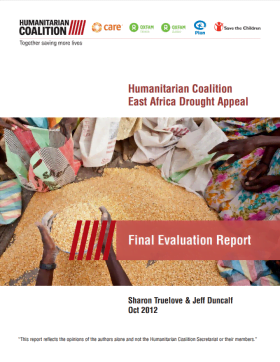
Humanitarian Coalition East Africa Drought Appeal: Final evaluation report
Report
In 2011, suffered from one of the worst droughts in 60 years which left more than 13 million people in need of food, water and emergency healthcare. Canadian donors contributed $14 million to the Humanitarian Coalition’s joint appeal for East Africa’s drought of 2011. These funds helped to set up...
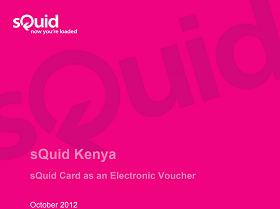
sQuid Card As An Electronic Voucher Aid Management
Report
Electronic payments technologies have advanced significantly and some have the capability to meet the demands of transferring money to large numbers of recipients with a high level of accountability that must accompany such cash transfer programmes. sQuid is one of these.

The Crisis in the Sahel – Special Feature
Report
The special feature of this issue of Humanitarian Exchange focuses on the humanitarian crisis in the Sahel region of Africa, where aid agencies estimate that more than 18 million people are affected by food insecurity. In response to this crisis, cash and vouchers programming has been largely used. In...

Cash Consortium for South/Central Somalia: Combined Risk Analysis
Report
Since mid-2011, the Cash Consortium has been providing access to food and other non-food items through unconditional cash grants for the most vulnerable populations in South Central Somalia. The context is highly challenging, due to continuing conflict, lack of governance, high criminality and low levels...
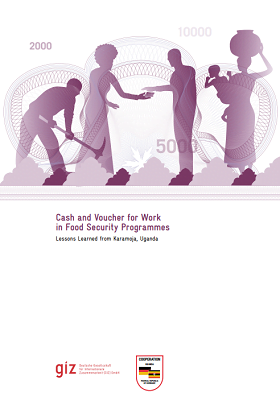
Cash and Voucher for Work in Food Security Programmes: Lessons learned from Karamoja, Uganda
Case Study
This report examines a Deutsche Gesellschaft für Internationale Zusammenarbeit (GIZ) GmbH supported labour-intensive cash for work and voucher for work project which was implemented in the framework of GIZ’s Food and Nutrition Security and Conflict Management Project (FNS) in Karamoja. The FNS project...
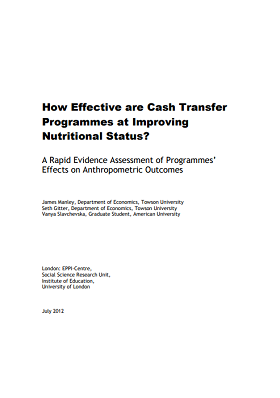
How Effective are Cash Transfer Programmes at Improving Nutritional Status?
Report
Cash transfer programmes are a widely applied social protection scheme that has achieved successes in fighting poverty worldwide. A large literature has sprung up around these programmes, yet the relationship between cash transfer programmes and the nutritional status of recipient children is unclear. Can...
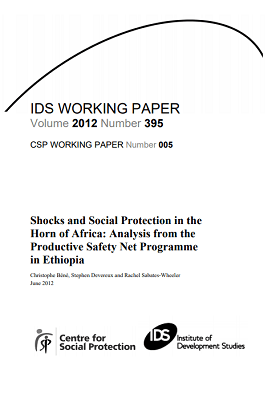
Shocks and Social Protection in the Horn of Africa: Analysis from the Productive Safety Net Programme in Ethiopia
Case Study
Using panel data from the Ethiopian Productive Safety Net Program, this paper explores the degree to which this social protection programme has been successful in protecting its beneficiaries against the various shocks that have affected the Horn of Africa in the recent past. The analysis suggests that...
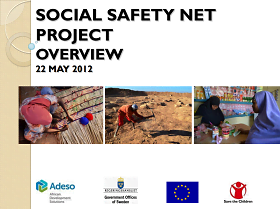
Social Safety Net Project Overview
Presentation
This presentation provides an overview of a three-year social safety net project being implemented by a consortium of Adeso and Save the Children (UK), with the overall aim to reduce community vulnerability to chronic food insecurity in two regions of Somalia/Somaliland identified as being highly...
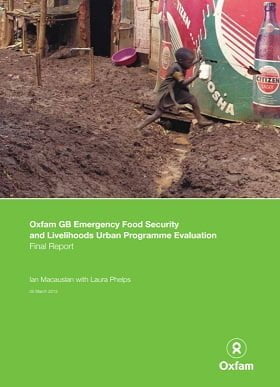
Oxfam GB Emergency Food Security and Livelihoods Urban Programme Evaluation
Report
The global urban population is now larger than the rural population. While rural areas in general remain worse off than urban areas, the number of people in urban poverty is growing fast, and urban dwellers are vulnerable to significant disasters. Development and humanitarian agencies are therefore...
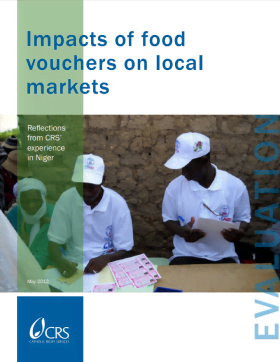
Impacts of Food Vouchers on Local Markets: Reflections from CRS’ experience in Niger
Report
In mid 2010, CRS-Niger designed and carried out a food voucher program to assist the most needy one-third of households in the departments of Ouallam and Tillabéri due to the poor harvest in 2009 (CRS, 2010). The ADVANCE project was implemented in collaboration with a local NGO partner Association pour...

Review of emergency cash coordination mechanisms in the Horn of Africa: Kenya and Somalia
Report
In response to the drought and famine in the Horn of Africa in 2011, cash transfer programming (CTP) has been used extensively as a modality to meet humanitarian needs. Partly because the conditions permitted it (functioning markets, cash economies and delivery mechanisms), and partly because delivering...

Humanitarian Exchange: Special feature. New learning in cash transfer programming
Report
The special feature of this issue of Humanitarian Exchange, co-edited with Sarah Bailey and Breanna Ridsdel, focuses on new learning in cash transfer programming. While cash is now an accepted tool, and is increasingly being used in humanitarian response, most programmes are small and gaps in analysis and...
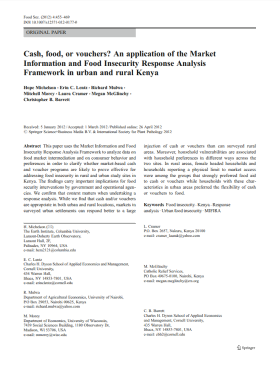
Cash, Food or Vouchers? An application of the market information and food insecurity response analysis framework in urban and rural Kenya
Policy paper
This paper uses the Market Information and Food Insecurity Response Analysis Framework to analyze data on food market intermediation and on consumer behavior and preferences in order to clarify whether market-based cash and voucher programs are likely to prove effective for addressing food insecurity...

Cash Emergency Preparedness (CEP) Pilots
Guidelines and Tools
CEP guidelines and key findings from pilot assessments.
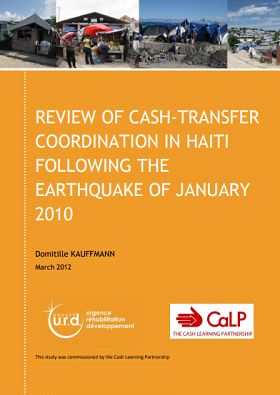
Review of Cash-transfer Coordination in Haiti following the Earthquake of January 2010
Case Study
This study, commissioned by the CALP Network, aims to review and document the coordination of cash transfer programmes (CTP) implemented from the emergency phase in Haiti. It is part of a wider review of CTP coordination in emergency situations which includes three case studies (Pakistan, Haiti and the...

Multi-Cluster/Sector Initial Rapid Assessment (MIRA)
Report
The immediate aftermath of a sudden-onset disaster is a critical period of time when the humanitarian and donor communities need to make key decisions on how to best support the affected country or region and its populations. However, during that brief period, limited comprehensive information on the...